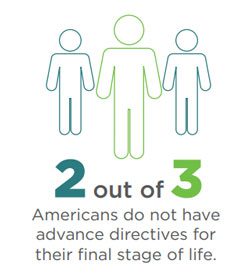You’ve probably noticed that advance care planning conversations are gaining attention as an important intervention in healthcare. Why? Most importantly, these conversations help people get the kind of care at the end of life that is consistent with their personal goals and wishes. In addition, studies show that advance care planning (ACP) conversations improve multiple outcomes including fewer hospital admissions and intensive treatments at the end of life, increased enrollment in hospice care, and a higher likelihood of the person dying in the setting of their choice. Not surprisingly, satisfaction ratings increase significantly with ACP discussions. There’s no denying that these conversations lead to great outcomes for the people in our care, and for our healthcare organizations.
 ACP discussions also help clinicians know what to do in the “right now,” when decisions are needed. According to a report from The Institute of Medicine (2014), approximately 40% of adults in inpatient settings, 44-69% of nursing facility residents, and 70% of older adults are unable to make their own medical treatment decisions. We will only know what people want and who they want to speak for them if we engage in effective ACP conversations.
ACP discussions also help clinicians know what to do in the “right now,” when decisions are needed. According to a report from The Institute of Medicine (2014), approximately 40% of adults in inpatient settings, 44-69% of nursing facility residents, and 70% of older adults are unable to make their own medical treatment decisions. We will only know what people want and who they want to speak for them if we engage in effective ACP conversations.
At their best, ACP discussions involve talking with people about what matters most to them, their values, concerns, and experiences around end-of-life issues, and how these things shape their decisions. Most healthcare professionals want to talk to people about these things, and yet, the majority of clinicians are uncomfortable with the topic, are unprepared to have the conversations, and don’t engage in these discussions with the people in their care. But there’s a better way.
Improving your skill and confidence in advance care planning conversations takes some time and effort, but it can be done, and there are plenty of tools and resources to help you. You might be surprised that the joy in your practice increases as you learn more and get better at talking to those in your care about what they really want.
How to Improve Your Skills and Confidence in Having Advance Care Planning Conversations
1. Take a training course
Find a high-quality ACP conversation training course that covers not only the core components of advance care planning, but also the keys to developing conversational skills. The Five Wishes courses from Relias can help you learn the skills necessary for effective and compassionate conversations with people in your care.
2. Use a framework to guide your conversations
Having a framework for your conversations makes it easier to remember to cover the basics, as well as how to cover them. It also gives the person you’re talking to a reference point for your conversation, and can help them think on their own about what matters to them regarding end-of-life care and decision-making. The Five Wishes framework provides clear, simple guidance that covers the five most important domains to address when having advance care planning conversations.
3. Talk to other professionals who have ACP conversations
You are not alone! Find professional peers who also facilitate ACP conversations and ask them what they find most helpful. Talk to each other about what you find most challenging in starting, facilitating, and documenting conversations, and how you address those challenges. Sharing good resources can help your whole team to have better conversations. Participate in webinars and conference calls where sharing ACP experiences is part of the agenda.
4. Stay focused on what matters to the person
Sometimes we get too hung up on thinking of advance care planning as a task to accomplish, and we get frustrated if conversations don’t result in the outcomes we expected. Remember that ACP conversations are a process, and that the goal is to help this person understand their choices, reflect on their own values, and consider what they want – which can change. Stay focused on helping the person reflect and empowering them to talk with their loved ones about their wishes.
5. Practice, practice, practice!
Once you’ve learned the skills of having effective and compassionate ACP conversations, the best way to improve them is to practice. Have ACP conversations with your family and friends, your colleagues, your faith communities, and anyone else willing to engage. Have conversations with your loved ones about your own end-of-life wishes, and complete your own advance directives.
These five actions can have you on your way to feeling skilled and confident in ACP conversations. With training and practice, it will become more natural for you to talk with people about end-of-life decisions, and you’ll be helping to create meaningful outcomes for families as well as your organization.
Advance Care Planning
Learn more about utilizing tools, such as Five Wishes®, by watching our webinar, Advance Care Planning.
Watch The Webinar →





